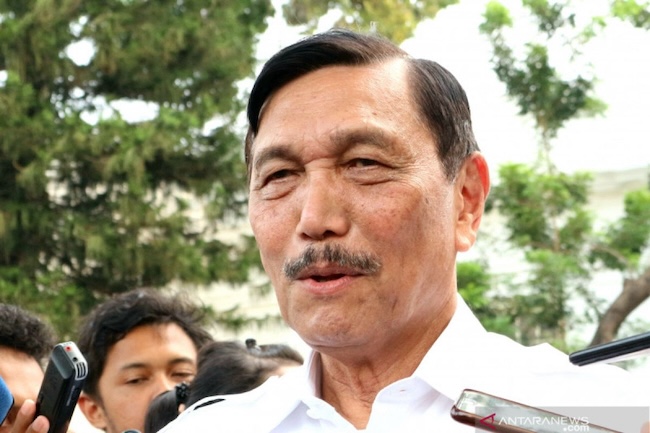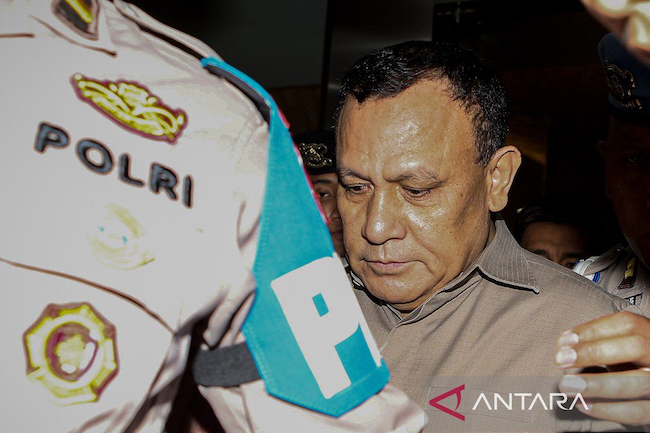A business alliance forged in 2008 between Joko Widodo and Luhut Pandjaitan formed the basis for a major axis in his presidency
President Joko Widodo (Jokowi) is commonly portrayed as a person from humble beginnings who emerged as a furniture-maker and self-made businessman, before entering politics. Such a background, so it was argued, explains his common touch and virtuous leadership. In fact, his presidency has been decidedly Machiavellian. Informal alliances and deal-making have subverted good democratic practice. In this context, Jokowi’s presidency can neither be understood in a ‘political-economy vacuum’, nor without identifying and explaining the formation and nature of the most powerful alliance at its apex.
The often neglected turning point in Jokowi’s political rise was a business alliance forged in 2008 between Jokowi then as Solo’s Mayor and Luhut Pandjaitan as the former Army ‘Special Forces’ (Kopassus) commander and Minister of Industry and Trade. From 2009 the Jokowi-Luhut partnership was formalised in the joint venture Rakabu Sejahtra, between Jokowi’s family furniture business and Luhut’s Toba Sejahtra group. It would prove to be a mutually beneficial arrangement. Jokowi gained Luhut’s protection, strategic skills and deep understanding of Jakarta’s elite politics. Although Luhut was at the time closely tied to Golkar chair and tycoon, Aburizal Bakrie, the alliance with Jokowi diversified his political risk by ‘betting’ that Jokowi’s populist style and ‘image-building’ (pencitraan) would be an advantage in winning elections. Luhut’s bet evidently paid off just a few years later with Jokowi’s 2012 electoral victory for Jakarta’s governorship. Luhut thereby functioned as Jokowi’s ‘patron’, arguably more so than the chair of his own party PDI-P, Megawati Sukarnoputri, whose late husband Taufiq Kiemas had doubted Jokowi’s prospects.
The fixer
After assuming the presidency in October 2014, President Jokowi faced resistance in his newly formed ruling coalition from party bosses Megawati, Surya Paloh and Vice President Jusuf Kalla, who refused to share power with Luhut. In response, Jokowi created a powerful chief of staff position for Luhut, from which he could increasingly influence and dominate cabinet. By mid-2016 Luhut was therefore able to gain strategic control of a seemingly modest portfolio, which he then turned into one of the most powerful ‘centres of the state’ as Coordinating Minister for Maritime and Investment Affairs. By leveraging a stronger power base and bargaining position for Jokowi in Indonesia’s intra-elite contestation, Luhut functioned as Jokowi’s key ‘political-fixer’ and what some dubbed a ‘de facto Prime Minister’, pugnaciously tackling the day-to-day problems of government, assembling the ruling coalition, and managing its internal rivalries.

For most of Jokowi’s two terms in office (2014-24) (except for few months in late 2023 while recovering from a stroke), Luhut has consistently carried out this role, including taking on numerous crucial interim cabinet posts and non-structural assignments. This special relationship between the two men reflects the extent to which Jokowi as president has relied on ‘informal ties’ and ‘mutual trust’ with Luhut rather than the ‘organisational system of the state apparatus’.
As a ‘fixer’, seeing the ‘state as a political marketplace’, Luhut also managed investment policies and paid careful attention to flows of government project finance and ‘informal slush funds’. As such Luhut was instrumental in controlling key state corporations including Indonesia Asahan Aluminium (Inalum) and Mining Industry Indonesia (MIND ID), and leading deals to divest foreign equity in the lucrative Freeport copper and gold and Vale nickel mining concessions and projects. He mobilised support for the controversial new capital city Nusantara and by establishing the Sovereign Wealth Fund (officially Indonesia Investment Authority). He also coordinated infrastructure (e.g. Trans Sumatra Tollway), transportation (Jakarta-Bandung high-speed train), health (COVID-19 crisis), education and tourism (North Sumatra’s Lake Toba Region) as well as agriculture projects (food estates and live-cattle imports). Luhut’s ‘coordination’ even extended to oil and gas policies associated with the ‘state oil company’, Pertamina, which relocated its headquarters to Luhut’s Toba Sejahtra owned ‘Sopo Del’ Tower.
Most notably, Jokowi delegated the government’s minerals policy, including the signature electric-vehicles procurement program, to Luhut. This saw Indonesia – the world’s biggest nickel producer – ban exports, greatly increase smelting capacity, and unleash large-scale smuggling of nickel ore. Project Multatuli and Tempo’s mapping and analysis of the nickel industry revealed that Luhut’s power network operates at its core. Luhut’s closest ally, retired Kopassus commander Sintong Panjaitan, is President Commissioner of the Bintang Delapan group, which partners with the Chinese Tsingshan group. to control Sulawesi’s Morowali Industrial Park. The Morowali Industrial Park is considered to be Indonesia’s biggest cluster of ‘ferro-nickel’ smelters producing relatively low value-added exports for the Chinese market. Further downstream, Toba Sejahtra’s electric-vehicle (and recharging stations) business Electrum is managed by Luhut’s nephew Pandu Sjahrir. Without any political resistance from Finance Minister Sri Mulyani, Luhut also helped to shape such fiscal policy and National Budget decisions as electric-vehicle subsidies. Overall, seasoned Indonesian economist Faisal Basri condemned nickel policy implications (and misguided nationalist rhetoric of ‘downstreaming’ or hilirisasi) as it favoured elite interests instead of generating significant positive effects for Indonesia’s industrialisation and net public benefit.
To protect and serve
In order to protect their growing power and wealth, Jokowi and Luhut have increasingly embraced the ‘politics of weakening, rewiring and controlling institutional checks’ (autocratic legalism), thereby intensifying intra-elite contestation and further debasing Indonesia’s procedural democracy. Under the Jokowi-Luhut alliance the Corruption Eradication Commission (KPK) was turned into a ‘political weapon’.
Jokowi and Luhut duplicitously claimed that the KPK has been functioning well, that Indonesia ‘now has a better and more integrated system and is on a downward trajectory’ in terms of corruption levels and that the ‘government would not intervene in law enforcement agencies’ such as the KPK. However, the political-economic reality behind the scenes has been categorically different. Former KPK Chair Agus Rahardjo (2015-19) and his Deputy Commissioner Saut Situmorang recently revealed that until the KPK was weakened in 2019 by defective legislation and a more amenable leadership team, they had resisted Jokowi and Luhut’s efforts to ‘rescue’ ally, former Golkar party boss and National Parliament Chair Setya Novanto from KPK’s enforcement net. Setya was duly found guilty of political corruption in 2018 and sentenced to 15 years in prison.
Jokowi and Luhut competed against PDI-P Chair Megawati and her ‘confidant’, National Intelligence Chief Budi Gunawan, for control over the weakened KPK. Although initially considered close to Budi, the then KPK Chair (2019-23), former police general Firli Bahuri, increasingly accommodated the Jokowi-Luhut alliance. Firli’s blunted, biased and sporadic anti-corruption approach had, according to University of Indonesia’s criminal law expert, Gandjar Laksmana, conformed to how ‘those in Indonesian politics tend to see corruption prevention as no arrests rather than no corruption’ (Interview, 2023).

From 2020, with the KPK ‘supervisory board’ (Dewas) ineffectual and ‘under his thumb’, Firli half-heartedly monitored nickel-smelter constructions, while ignoring such cases as Luhut’s alleged nickel-ore smuggling and protection racket for big foreign investors as exemplified by Chinese nickel exporter, Zhenshi Holding Group. Firli also refused to investigate a range of cases with substantial evidence, including Luhut’s alleged beneficial ownership of crisis-based COVID-19 PCR-test laboratories and the former Freeport ‘Wabu Block’ gold-mining concession, as well as Jokowi’s sons Gibran Rakabuming Raka and Kaesang Pangarep’s alleged money-laundering activities. Instead, Firli targeted Jokowi and Luhut’s main political rivals, especially those associated with the power networks of Surya Paloh, Jusuf Kalla and Megawati. This ignited conflicts that fractured the ruling coalition and, ironically, culminated in a sort of ‘boomerang effect’ with a personal feud between two police generals, Firli as head of the KPK, and Jakarta metropolitan police force chief Karyoto, revealing credible evidence against Firli as KPK’s first-ever venal chair. By late 2023, Jokowi was forced to dismiss Firli, though he did not restore KPK’s former independence and powers.
In what many have recognised as various attempts to perpetuate Jokowi’s political power, the Jokowi-Luhut alliance also plotted to engineer a ‘friendly’ political succession by way of extending the ‘life-span’ of Jokowi’s presidency, even retaining power-by-proxy. Megawati blocked these efforts but Jokowi’s unprecedented political manipulations of the Constitutional Court and Electoral Commission enabled his son Gibran Rakabuming Raka to stand for vice-president on the electoral ticket of former Kopassus commander Prabowo Subianto, another Luhut ally. Public intellectuals’ fears of Indonesia’s ‘dirtiest’ democratic election riddled with Jokowi’s partisanship in Prabowo and Gibran’s campaign, political-packing of regional leadership, pork-barrelling and vote-buying practices were realised in a landslide victory for the Prabowo-Gibran ticket on 14 February.
In an ideal world where the rule of law is fully applied, a far-reaching parliamentary inquiry into the 2024 election or ‘independent’ corruption eradication investigations, could build upon existing revelations about the flows of political slush funds pooling around Jokowi and Luhut’s business empires. Such investigations could provide an invaluable lesson for future political leaders that abuse of power should not be condoned. In reality, the interests of the Jokowi-Luhut alliance now appear to be increasingly safeguarded with most ‘political opposition’ fragmented, the KPK reined in and Indonesia’s incoming president, Prabowo, apparently determined to maintain the status quo. Overall, the discreet Jokowi-Luhut alliance has been the axis of Indonesia’s political-economy over the past decade. Alas for Indonesia, this populist, deal-making presidency has produced a decade of democratic decay. For Prabowo, as the next president, reversing that trend will not be a political priority in Indonesia’s intra-elite contestation.
Jeremy Mulholland (jeremypm@hotmail.com) is a political economist and executive director at Investindo International Pty Ltd. He writes on Indonesian elites, political corruption and the Corruption Eradication Commission (KPK). This article was published in Indonesian and with some revisions in Tempo magazine on 28 July 2024.












